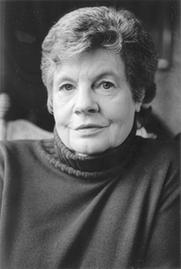 |
|
| A.S. Byatt | |
British author, critic, and Booker winner A.S. Byatt (Dame Antonia Susan Duffy), "one of the most significant writers and critics of our time," died November 16. She was 87.
Born Antonia Drabble, Byatt studied English at Cambridge, Bryn Mawr College, and Oxford. She began teaching at University College London in 1962. The Guardian noted that her first novel, The Shadow of the Sun, was published in 1964, just a year after A Summer Bird-Cage, the first novel by her sister, Margaret Drabble, "thus establishing the notorious and possibly exaggerated rivalry between them."
Byatt's reputation grew as she embarked on the Frederica Quartet, charting the changing nature of the female experience in the 20th century with the novels The Virgin in the Garden (1978), Still Life (1985), Babel Tower (1996), and A Whistling Woman (2002). "When she broke off in the middle of this project to write Possession, Byatt found both critical acclaim and a new audience," the Guardian noted. Possession won the Booker prize in 1990, becoming a bestseller both in the U.K. and U.S. The Children's Book (2009) was shortlisted for the Booker Prize and won of the James Tait Black Memorial Prize.
The recipient of many awards, Byatt became a CBE in 1990 and a DBE in 1999. In 2014, a coleopterist working in Central and South America named a species of iridescent beetle in her honor (Euhylaeogena byattae Hespenheide), inspired by her portrayal of naturalists in the novella "Morpho Eugenia" in Angels and Insects (1992). Byatt received the Erasmus Prize in 2016, awarded by the King of the Netherlands.
"She was also remarkable for her generosity to younger writers," the Guardian noted. "At a stage of her career when she might well have been excused for finding her own professional commitments a sufficiently heavy workload, she read new work voraciously. Her floorboards cracked under the load of novels and poems sent to her by writers and publishers who valued her approval far above that of reviewers. She could not possibly have read all of them, but she read an astonishing number."
Writing in the Guardian, Lisa Allardice observed: "She loved Europe, tennis, science, art and languages. 'I think the virtue I prize above all others is curiosity,' she told an interviewer. It is this rapacious curiosity that she brought to her 10 novels, many works of criticism and essays, and in so doing she helped change the British novel into something far more intellectually capacious and outward-looking. Hers was a life defined by literature. 'I'm more interested in books than people, and I always expect everybody else to be, but they're not.' The Dame will be greatly missed."
In a statement, Vintage wrote, in part, that Byatt "has been an integral part of Chatto & Windus's publishing since 1964, starting with her first novel The Shadow of the Sun. Twenty-three other spectacular novels and works of criticism followed.... Her novels showed a profound engagement with history and historical consciousness--and an understanding of the traditions in which she wrote--whether folktale or novel.... The world of publishing was hugely important in Antonia's life and she cultivated friendships all around the world (her work was translated into thirty-eight languages)."
"Antonia's books are the most wonderful jewel-boxes of stories and ideas," Clara Farmer, her publisher at Chatto & Windus, observed. "Her compulsion to write (A4 blue notebook always to hand) and her ability to create intricate skeins of narrative was remarkable. It was always a treat to see her, to hear updates about her evolving literary characters and indulge in delicious titbits of literary gossip. Like all Chatto's publishers before me, I was devoted to her and her writing. 2024 would have been her sixtieth (Diamond) anniversary as a Chatto author. We mourn her loss but it's a comfort to know that her penetrating works will dazzle, shine and refract in the minds of readers for generations to come."
Jenny Uglow, Byatt's longtime editor, said: "Working with Antonia Byatt was full of surprises.... Like many writers, she could hold the germ of a story in her head for a long time, sometimes for years, but when it emerged she would work on it assiduously in her notebooks and in conversations, reading widely to clarify the background of intellectual movements and artistic ideas, and mapping every scene in detail in her head, from the colors of clothes and the names of minor characters--which were often bizarre--to the complexity of train timetables. Finally, the shape was fully formed in her mind. Then it would flow on to the page, with not a change to be made."
Zoë Waldie, her literary agent, noted that Byatt "used to say that making things out of language was the most exciting thing she knew. She did this magnificently over many decades and held readers spellbound."

